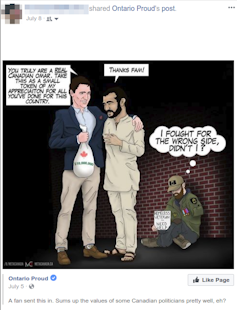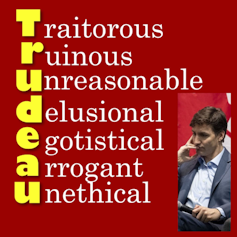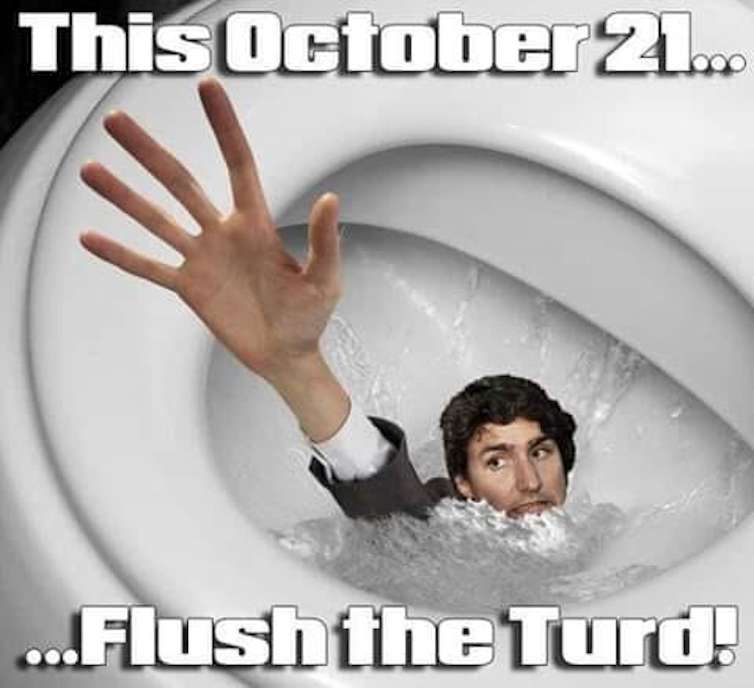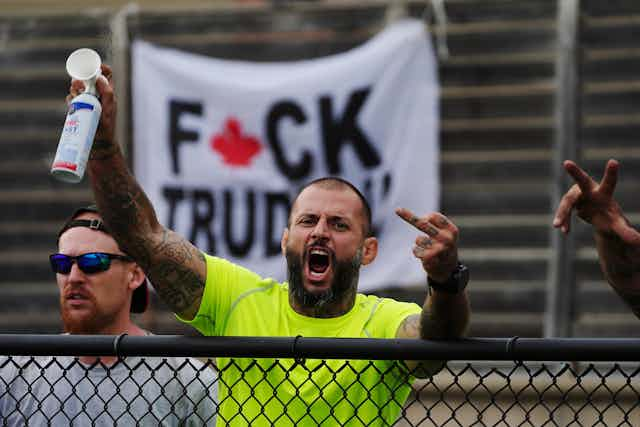Canada’s snap election has increasingly featured threats of violence against Liberal Leader Justin Trudeau. Though not the only leader to be harassed, Trudeau’s campaign stops in recent weeks have been disrupted by small, hostile, mostly white crowds — one protester was charged with throwing gravel at Trudeau during a campaign appearance.
Outside of Canada, people might be surprised to hear about the anger directed at a politician known internationally as a youthful, charming, energetic progressive. But our research into Canadian memes has found a persistent, visceral dislike of Trudeau among many right-wing online communities.
In Canada, Trudeau’s a polarizing figure — online, people either love or immensely dislike him.
Trudeau, the son of famed former prime minister Pierre Elliott Trudeau who enjoyed a similar international celebrity, ushered in another bout of Trudeaumania when he won his first election in 2015. That campaign was defined by a focus on “sunny ways” and Instagram style as part of a progressive reset after years of Conservative rule.
Trudeaumania 2.0 was real, another example of how closely linked celebrity and political culture can sometimes be.

Two years later, Trudeaumania had largely dissipated, though it never existed among right-wing groups. In 2017, a friend shared a post from Ontario Proud, part of Canada Proud, a popular Facebook page run by a right-of-centre media strategist. It was a cartoon that originated on an alt-right sub-Reddit suggesting Trudeau has betrayed white, wounded male veterans.
The Islamic crescent on Trudeau’s socks is perhaps a conspiratorial explanation of the false belief that Trudeau paid out to Omar Khadr, a Canadian citizen who at the age of 15 was detained by the United States at Guantanamo Bay for 10 years for the wartime killing of a U.S. army sergeant in Afghanistan. This allegation ignores the violations of the Canadian Charter of Rights and Freedoms that led to a $10.5 million court settlement with Khadr.

Accusations that Trudeau has betrayed Canada was a common theme as we began studying grassroots Facebook pages in 2019, another election year. We found no Trudeau meme pages celebrating the leader.
Instead, we watched anti-Trudeau pages describe him as a traitor who deserved to be treated with contempt.
In another meme, Trudeau’s name had been reduced to “Turd.”

Blackface, sexual predator accusations
These right-wing groups had a distinct reaction to the blackface scandals that erupted during the 2019 campaign. They believed, as did some mainstream commentators, that the prime minister’s past behaviour symbolized Liberal hypocrisy, accusing him of a performative and superficial embrace of equality and social justice.
The blackface, however, seemed to matter less to right-wing groups than framing Trudeau as a sexual predator. They “uncovered proof” of Trudeau’s alleged lecherous conduct at past schools and targeted the placement of his hands in a photo from a 2001 Bollywood gala.
Memes became evidence collages designed to prove Trudeau’s past sexual misconduct and used to negatively taint his contemporary image.
Trudeau was a sex symbol, alright, but the worst kind, according to these groups. Trudeau denied the allegations and apologized for one incident though he said he had no memory of it. But the claims had made their mark in these communities and further soured their adherents on the Liberal leader.
Pandemic intensified anti-Trudeau feelings
The COVID-19 pandemic offered these groups further cause to feel betrayed by Trudeau.

Pandemic lockdowns, vaccine mandates, vaccine passports and disruptions to businesses offered new ways to interpret Trudeau’s arrogance and betrayal. The reaction wasn’t exceptional — most countries in the world are dealing with anti-maskers and anti-vaxxers — but rather the continuation of anti-Trudeau attitudes that regard him as an incompetent leader who is not to be trusted, whether with women or with the economy.
Our observations show a darker side to Trudeau’s celebrity status. As much as Trudeau may be regarded as a likeable person by many Canadians and international observers, he’s disliked by right-wing groups for perhaps similar reasons: he’s a rich, entitled white man in a position of privilege and power who they view as betraying what they often call “old-stock Canadians.”
This may explain Trudeau’s niche unpopularity online and the white, angry crowds appearing at his rallies.
As journalist Fatima Syed writes, “these largely white groups of protesters that have followed Trudeau have an unfair privilege that has been afforded to them by all aspects of society: they largely get away with their hateful rhetoric and actions, and don’t get called out or punished for it.”
That privilege might also explain a media blind spot. There is a multitude of right-wing rage online, and as a society, Canada needs to urgently make sense of the racial and cultural power dynamics that are underlying angry and hateful discourse.


